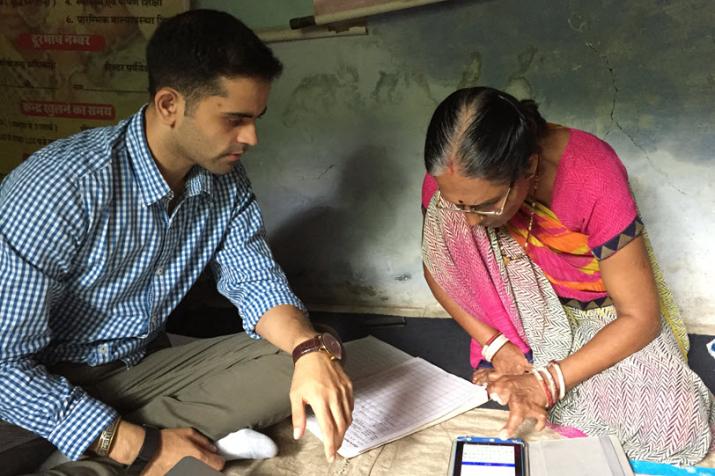
Aditya Mehta trains an Anganwadi worker in Khanpur in the use of the Rajsangam app on a tablet provided by the Antara Foundation.
Published February 7, 2019, last updated on April 7, 2020
Aditya Mehta MS’16 is passionate about the intersection of global health policy and international relations. Now working at the Antara Foundation, a New Delhi-based nonprofit focused on scaling up public health delivery, he’s using the skills he honed in the Duke Global Health Institute’s (DGHI’s) Master of Science in Global Health program.
Building a Foundation in Maternal and Child Health
Mehta completed his undergraduate degree at Emory University, where he was introduced to global health in a Disease and Human Behavior class. Mehta majored in sociology and religion, but his minor in global health, cultures and society helped him discover his passion for health policy and maternal and child health.
Mehta spent one of his undergraduate summers doing research in Kenya through Innovating for Health Transformation in Africa, a joint program between Harvard University and Massachusetts General Hospital. His project aimed to improve children’s nutrition in low-income areas of Kisumu by teaching them how to grow their own vegetables. Mehta also took classes that exposed him to cost-effective interventions such as the uterine balloon tamponade, a device that can be used to reduce maternal deaths caused by postpartum hemorrhage.
This program solidified Mehta’s focus on maternal and child health and formed the basis of his graduate research at DGHI, which he conducted in South Africa and Ghana. Mehta interviewed policymakers, health care providers and academics to learn about barriers to integrating the uterine balloon tamponade (UBT) into health systems. He found that lack of awareness and budgetary constraints were the primary reasons healthcare providers decided not to use the UBT.
Connecting with Global Health Leaders at Duke
While at DGHI, Mehta appreciated the opportunities he had to interact with veterans of the global health field. A speech by Michael Gerson, speechwriter for George W. Bush, was particularly impactful for Mehta and sparked his interest in working in the Darfur region at some point in his global health career.
DGHI classes, especially Global Health Challenges and Health Systems in Developing Countries, helped prepare Mehta for the challenges he now faces doing fieldwork in India. “The global health program imparted the necessary technical knowledge and offered the opportunity to practice that knowledge while conducting research for the graduate thesis,” he said.
Scaling up Maternal and Child Health and Nutrition
Currently, Mehta is working at the Antara Foundation’s office in Rajasthan’s Jhalawar district in northern India. He travels between eighteen villages, training health workers on a mobile application called Rajsangam. The application synchronizes health data across three different health workers that serve each village. Each of these workers collects a different set of data from their visits with children and mothers, so health records can easily become inconsistent if not updated and shared frequently. Rajsangam allows each worker to input data individually and integrates the data into one database. Mehta’s trainings enable new health workers to use the application and help current users hone their skills.
Mehta sees himself growing into a career focused on the intersection of international relations and global health in politically unstable or active conflict environments. “My work at Antara has prepared me to work for long periods of time in resource-poor settings and adapt to the working styles of supervisors in the health system that I’m expected to liaise with regularly,” he said.


